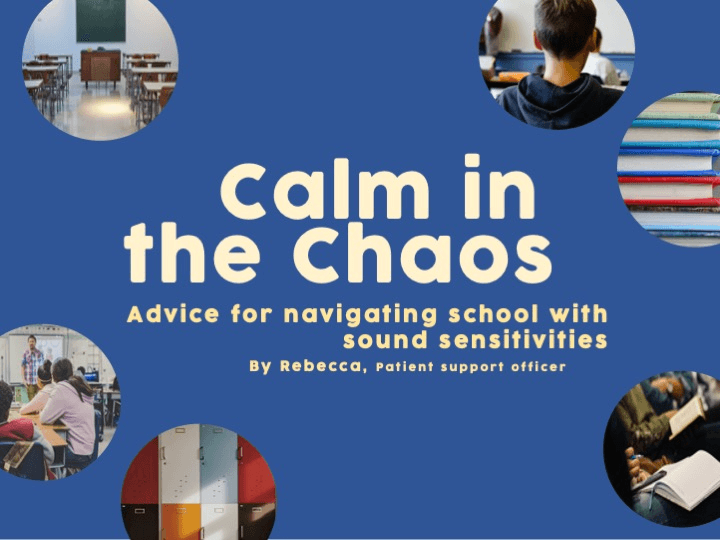
Finding Calm in the Chaos
My advice for navigating school when you have sound sensitivities
I’m Rebecca, and if you’ve read my blogs before then you’ll know that misophonia has been a part of my life for two decades. I’m now a support officer with Hashir International and I write about my experiences with sound sensitivities, therapy and living with misophonia.
Misophonia is a condition that causes intense emotional and physical responses to certain sounds, so understandably it can significantly influence a teenager’s academic and social life. Looking back I vividly remember the impact it had on me and the stress it put me under on a daily basis. My misophonia truly began having an impact on my life when I started high school. It was around age eleven that dinnertimes became full of rage and stress, and I couldn’t stand the sound of coughing, sniffing or chewing. Add these emotions into a school environment and it quickly became a pressure cooker of fear and anger. However, with the right strategies and support, I feel it is possible to manage misophonia effectively and create a more comfortable and productive time at school.
Having now found a way to manage my misophonia through CBT, I’d like to look back and offer my perspective on what can take away some of the strain. Every student and teacher is different, but I do believe that educators and schools are constantly becoming more aware of sound sensitivities and each year become more inclusive and understanding environments for misophonia sufferers.
Educate yourself and others
Understanding misophonia is crucial in managing its impact. Take the time to research and learn about the condition, its triggers, and its effects on your mind and body. By educating yourself, you can develop a sense of control and if you want to, give you the tools to explain your condition to others, such as teachers, classmates, and friends. Click here for more information about misophonia.
Communication
If you feel your misophonia is having a significant impact on your happiness and ability to learn and thrive at school – it may be time to consider talking to your teachers and staff about your misophonia. I have written a whole article with advice on discussing your misophonia, so please read that in more detail here.
When you and/or your parents decide to talk to members of the school staff, it would be helpful to describe specific triggers and possible accommodations that can be made to minimize exposure to triggering sounds. This may include sitting away from noise sources, using noise-cancelling headphones, or allowing breaks in quiet spaces. Open communication is key to ensuring that your educational environment is conducive to learning and calm.
Figure out your own coping tools
Discovering and practising coping strategies can empower you to regain control over your emotional and physical responses. CBT techniques can be particularly effective. As one example, CBT involves challenging negative thoughts and beliefs about sounds, helping you keep calm and eventually, it will reduce the intensity of your response over time. Working with a CBT therapist can provide personalized guidance and support in implementing these tools. This is what I was able to do throughout my CBT programme with Hashir International, and although I am well past my education now, I can clearly imagine how it would have helped to have those tools at the time.
Keeping calm so you can carry on!
Learning relaxation techniques, such as deep breathing exercises and meditation can help you calm your mind and body during challenging situations. Additionally, practising mindfulness techniques can increase your awareness of the present moment, allowing you to focus on positive experiences rather than getting overwhelmed by triggering sounds.
Find or build a support network
Connecting with others who understand misophonia can be immensely beneficial. Look for mental health or neurodiverse support groups, both online and offline, where you can share your experiences, exchange coping strategies, and find comfort in knowing you are not alone. Your friends, family, and school counsellors can also provide valuable emotional support, so don’t hesitate to lean on them when needed.
Self-care is essential
Finding what keeps you healthy and happy can significantly contribute to managing misophonia. Try to prioritise regular fun exercise or walks, adequate sleep, and whatever works for you to keep your mind and body in the best condition to respond to stress. Engage in activities that bring you joy, such as hobbies, creative outlets, or spending time in nature. Taking care of yourself holistically will enhance your overall well-being and resilience in coping with misophonia. This still remains an essential tool for me, decades later, to manage my triggers and find calm in the chaos.
There is no denying that having misophonia can add a huge extra load of stress and anxiety to school. But it is essential to also remember that you have the power to manage and overcome these difficulties. By looking after yourself, communicating your needs, and applying coping tools, you can create a more comfortable and productive school experience.
Remember, you are not defined by your misophonia; it is just one aspect of who you are.
With the right support and determination, you can achieve your goals and navigate school happily. Good luck out there!